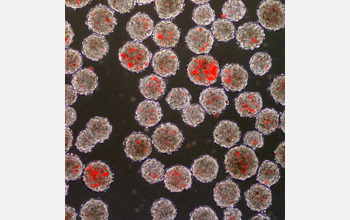Multimedia Gallery
Microsphere-mediated Delivery Method(Image 2)
Microsphere-mediated Delivery Method (Image 2)
Fluorescent microscopy image overlaid with phase image to display incorporation of microspheres (red stain) in embryoid bodies (gray clusters). The research of Todd McDevitt, an assistant professor in the Coulter Department of Biomedical Engineering at Georgia Tech and Emory Universities, shows that delivering molecules via biodegradable microspheres enhances the efficiency and purity of stem cell differentiation.
More about this Image
Directing embryonic stem cells to efficiently differentiate into a specific cell type has been challenging to this point. Embryonic stem cell therapies have been proposed for regenerative medicine and tissue replacement after injury or disease. But the inability of stem cells to efficiently develop into the desired specific cell type, such as muscle, skin, blood vessels, bone or neurons, has limited the potential clinical utility of this therapy. But new research by McDevitt and his research team (and supported by a grant from the National Science Foundation)--which includes graduate students Richard Carpenedo and Andrés Bratt-Leal and undergraduate students Ross Marklein and Scott Seaman--shows that delivering molecules within aggregates of embryonic stem cells via biodegradable microspheres enhances the efficiency and purity of differentiation--the process the cells undergo to become more specialized. The team fabricated biodegradable polymer microspheres that could contain growth factors, proteins or other small molecules.
McDevitt's team tested the impact of the poly(lactic-co-glycolic acid) (PLGA) microspheres on embryonic stem cell differentiation under different conditions by varying the microsphere-to-cell ratio and speed at which the aggregate cells were mixed with the microspheres. They also included a fluorescent dye in the microspheres so the degree of incorporation of the microspheres within the embryoid bodies could be assessed using fluorescent microscopy and spectroscopy. To learn more about McDevitt's discovery, see the Georgia Tech news story, "Fate and Function: Molecule Delivery Method Improves Embryonic Stem Cell Differentiation.". [Research supported by NSF grant CBET 06-51739.] (Date of Image: April 9, 2008) [Image 2 of 3 related images. See Image 3.]
Credit: Image courtesy Todd McDevitt
Images and other media in the National Science Foundation Multimedia Gallery are available for use in print and electronic material by NSF employees, members of the media, university staff, teachers and the general public. All media in the gallery are intended for personal, educational and nonprofit/non-commercial use only.
Images credited to the National Science Foundation, a federal agency, are in the public domain. The images were created by employees of the United States Government as part of their official duties or prepared by contractors as "works for hire" for NSF. You may freely use NSF-credited images and, at your discretion, credit NSF with a "Courtesy: National Science Foundation" notation.
Additional information about general usage can be found in Conditions.
Also Available:
Download the high-resolution JPG version of the image. (2.6 MB)
Use your mouse to right-click (Mac users may need to Ctrl-click) the link above and choose the option that will save the file or target to your computer.

